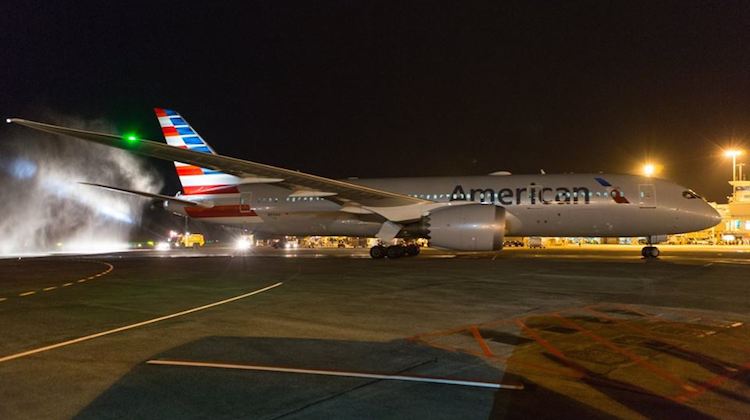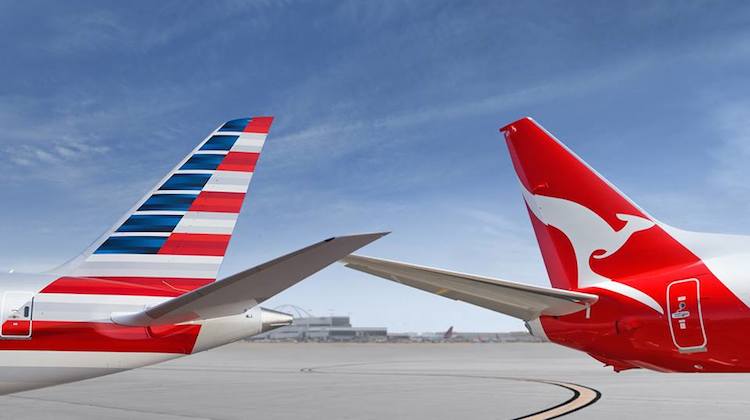American Airlines and Qantas have called on the United States government to “promptly approve” its proposed joint-venture alliance on trans-Pacific routes given its substantial consumer benefits and absence of any substantial complaints.
The application, which is the two carriers’ second attempt to forge a closer relationship and secure anti-trust immunity (ATI), has been before the United States Department of Transportation (DOT) since February 8.
The DOT said on November 1 it had finished the initial review of the application, adding that the record was now “substantially complete”.
In their latest submission to the DOT, dated December 4, American and Qantas said the evidence before the Department unambiguously showed consumers would benefit from the proposed joint business agreement (JBA) and stimulate additional demand.
Further, it said there was widespread support for the alliance being approved, noting the 1,138 notes of support from government officials, airports, travel agents, business associations and corporations, among others.
“Given the significant record evidence of substantial consumer benefits from the Proposed JBA and absence of any substantial complaints, the Department should promptly approve and grant ATI,” the American and Qantas submission said.
“The consumer benefits of metal-neutral JBAs are clear and proven. The Proposed JBA is virtually unopposed, and no party has disputed that the Proposed JBA will unlock hundreds of millions of dollars in benefits to travellers between the United States and Australasia.
“American and Qantas respectfully request that the Department expeditiously approve the Proposed JBA and grant ATI.”
The two carriers are making a second attempt to forge a closer relationship after their initial bid was withdrawn in late 2016, when a Show Cause Order (SCO) indicated the United States Department of Transportation (DoT) was inclined to reject the application on competition grounds.
American and Qantas have said previously the granting of ATI would result in up to US$440 million of consumer benefits, including the maintaining of some trans-Pacific services such as Qantas’s Sydney-Dallas/Fort Worth nonstop flight, as well as American’s nonstop services from Los Angeles to Auckland and Sydney.
Further, the submission noted authorisation could also facilitate the launch of new routes and the re-timing of existing services.
In September, the two carriers told the DOT their current level of codesharing was akin to keeping the lights on as they awaited a decision on the proposed tie-up.
Since the SCO was handed down in November 2016, American and Qantas have continued some level of codesharing on each other’s networks, particularly on domestic services in Australia and the United States.
However, Qantas took its QF airline code off American’s Los Angeles-Sydney service, while American took its AA code off Qantas’s Sydney-Los Angeles and Sydney-Dallas/Fort Worth flights.
The two carriers also “scaled back or paused” efforts to improve the passenger experience such as coordination of baggage handling, lounge services, investments in infrastructure, IT integration, revenue and yield management integration, scheduling, and frequent flyer benefits following the SCO.

Qantas chief executive Alan Joyce said recently new routes between Australia and the United States were off the agenda until a decision from the DoT.
Asked at the airline group’s 2017/18 full year results presentation in August about whether the 787-9s would be used to open up new destinations in the United States such as Chicago or Seattle, Joyce said that would be influenced by the outcome of the DoT’s application process.
“We’ve made it very clear our ambitions to grow our North American operations with more destinations and the 787 gives us great capability in order to do that,” Joyce said.
“We are working through the Department of Transport application. They’ve asked us for more information, which was expected.
“We’re still confident, as America Airlines are, that we will get the anti-trust immunity. We need that to be resolved because that does influence which of those destinations actually works.”
American and Qantas open to periodic review of any ATI
A submission from United States-based airline Jetblue called on the DOT limit its grant of ATI to three to five years and add a requirement that American and Qantas sought a renewal of ATI thereafter.
The requirements were similar to the Australian market where the Australian Competition and Consumer Commission (ACCC) has approved airline partnerships for a fixed term, with the parties having to reapply for authorisation prior to end of that term.
American and Qantas said they did not oppose having their alliance, should it be approved, subject to periodic review by the DOT.
“The Parties are confident that the Proposed JBA will generate substantial consumer benefits and, for this reason, would not oppose a Department review of the Proposed JBA after five years,” the submission said.
“Indeed, the Department has the authority to review any of its grants of ATI at any time.”
However, it said any review “should be no sooner than five years after implementation”.
“While the Proposed JBA will begin to benefit consumers immediately, a review any sooner than five years after implementation will capture only a snapshot of the then-current progress of integration and infrastructure investment within the Proposed JBA,” the submission said.
“As a specific example, in its transatlantic JBA with British Airways, it took several years for the JBA carriers to fully implement the technical requirements needed to integrate revenue and yield management systems.
American Airlines president Robert Isom was reported saying in September he expected a decision from the DOT some time in 2019.
“We feel really good about where things stand,” Isom is reported to have told staff according to the View from the Wing website.
“Our hope is that sometime in 2019 that we get approval for joint business then we’re off to the races.”
And Joyce told Flightglobal on the sidelines of a oneworld media briefing in New York on December 5 he was hopeful of a decision in early 2019.





